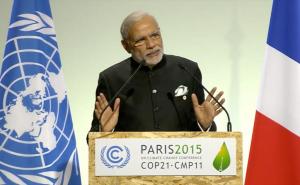The United Nations climate talks in Paris have ended with an agreement between 195 countries to tackle global warming. The climate deal is at once both historic, important and inadequate writes Simon Lewis for The Conversation.
There are five things to sum up the Paris climate talks for those of us who haven’t followed the historic deal closely:
1. A historic moment: The fact that from superpowers to city-states to fossil fuel dependent nations to vulnerable low-lying island nations, all have put pen to paper. It’s a globally coordinated action on climate change which deserves a thunderous applause. It has four critical elements to it:
(a) : A common goal which has now been defined. All parties have agreed to hold temperatures “well below 2 degree Celsius to pre-industrial levels and to strive to limit the temperature increase to 1.5 degree Celsius above pre-industrial levels.”
(b) The agreement requires matching scientifically credible reductions in carbon dioxide and other greenhouse gas emissions. It states that emissions should peak “as soon as possible,’” an then be rapidly reduced.
(c) It is understood that countries need a mechanism to move from today to zero emission standards.
(d) There are five-year reviews pledged. Each country would be required to show that there has been an increase in their emission-level cuts.
(e) All developed countries need to rapidly move from fossil fuel energy to renewable source. However, the challenge is bigger for developing nations like India. They are being required to leapfrog the fossil-fuel age. They need funds to do so. A key part of the agreement provides US$100 billon per year to 2020 and more thereafter.
The world has clearly agreed upon the roadmap on climate.
2. It’s not enough to avoid dangerous climate change: For some, climate change is already deadly; especially the low-lying areas. Even the most ambitious attempt to zero emissions in coming decades are extremely challenging. Importantly, there are no penalties except public shaming. How governments resist the deep pockets of fossil fuel industry is a huge factor. Another critical matter would be how countries who have adhered to the commitment by 2023 react when they see others haven’t kept their pledge. The agreement then could fall apart.
3. We’ll have to remove carbon dioxide from the atmosphere
The warming we see from greenhouse gas emissions is dominated by the cumulative emissions of carbon dioxide. Given the emissions so far, limiting warming to “well below” 2°C, and anywhere near 1.5°C means reducing CO2 emissions to near zero extremely quickly.
Then society will need to continue further, to negative emissions. That is, removing carbon dioxide from the atmosphere and storing it somewhere else. There are various options here, from planting trees and keeping restored forest in perpetuity, enhancing uptake in soils, or using biomass energy in power plants then storing the carbon dioxide underground (so-called Bio-Energy with Carbon Capture and Storage). Expect to hear a lot more about this.
4. Expect across-the-board policy changes
To get to zero emissions this century requires many policy changes. Fossil fuel companies must have their subsidies stripped. Investments in high-carbon emitting infrastructure must end, particularly World Bank loans and other regional multilateral bank support for countries. Zero emissions buildings will become the norm. Tropical forests will have to be protected to reduce and then eliminate deforestation.
Expect a greater push on the technological limitations on renewable energy, with big new investments, mostly improving how to store power, for when the wind is not blowing and the sun is not shining. Expect the cost of renewables to sink much further as these technologies are scaled up and implemented worldwide. Expect significant areas of the world to be given over to wind turbines and solar farms.
5. The world’s most vulnerable countries got their issue centre stage
Paris was a high-stakes game of geopolitical poker. Surprisingly, those countries with the poorest hand came out better than expected. The climate talks were subject to a series of shifting alliances going beyond the usual income-rich northern countries and income-poor global south countries. Central to this has been US-Chinese diplomacy, both agreeing to limit emissions, and more recently the new Climate Vulnerable Forum grouping of countries. From nowhere, the forum has forced keeping global temperatures to 1.5°C high on the political agenda.
We haven’t heard the last of this level of ambition – one of the decisions in the Paris agreement is to invite the Intergovernmental Panel on Climate Change to produce a special report on the impacts at 1.5°C, and emissions pathways consistent with this level of warming.
These countries didn’t get everything they wanted – the US would not accept liability in financial terms for states that may lose their territory to rising sea levels in the future. But they played their hand extremely smartly.


